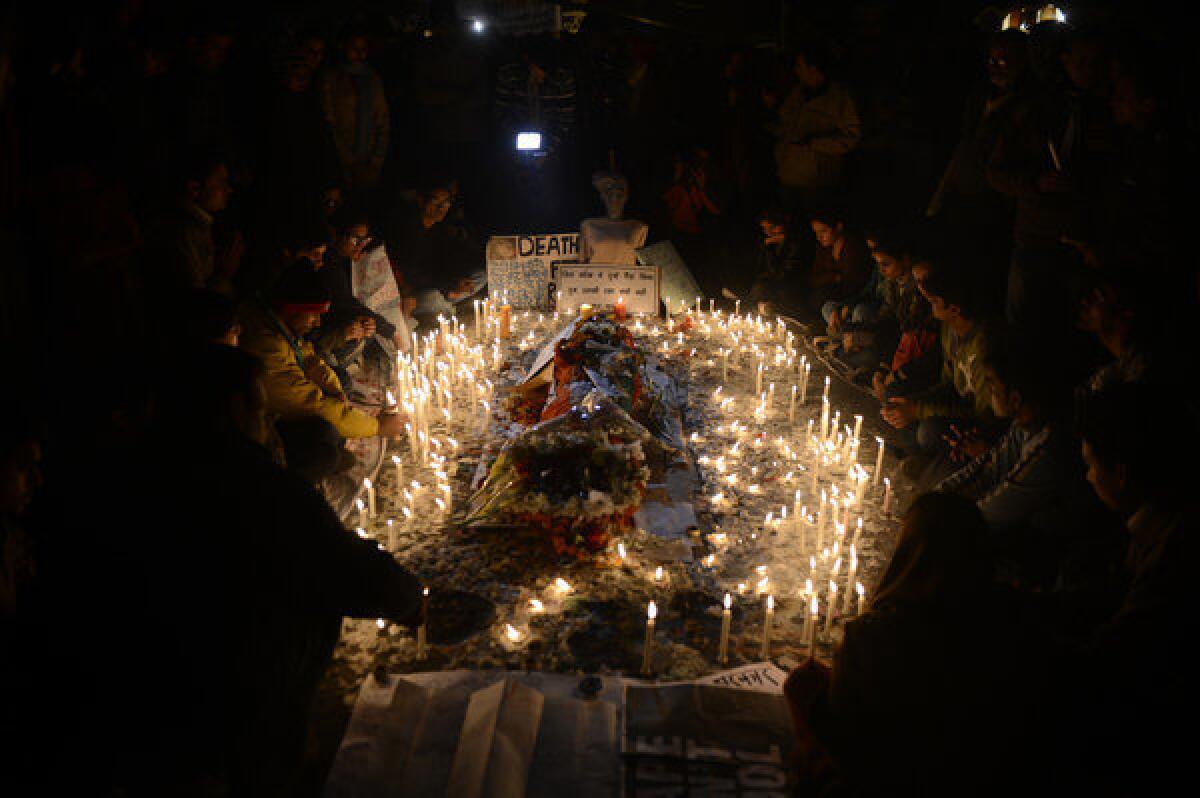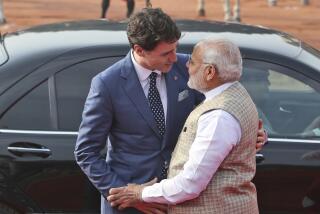Death of Indian rape victim spurs reflection, calls for reform

The gang rape that took the life of a 23-year-old Indian medical student has catapulted the young woman into martyrdom and galvanized an outraged nation to demand better protection of its women.
In place of New Year’s Eve revelry, Indians gathered in solemn candlelight vigils Monday night, appealing for tougher laws and a change of the national mind-set that has long tolerated sexual assaults as an unavoidable evil in India’s teeming urban centers.
Politicians and human rights advocates have a long road ahead to reform antiquated laws that only vaguely define sexual assaults as criminal behavior and to compel law enforcement and medical workers to cease subjecting victims to “virginity tests” and other humiliations.
Such insensitive handling probably explains the low incidence of reporting rape in India despite women’s insistence that it is so pervasive as to chase them from city streets after dark.
National Crime Records Bureau statistics show 24,200 rapes reported in 2011, or fewer than two cases per 100,000 population. That compares, according to the United Nations Office on Drugs and Crime, with 27 per 100,000 in the United States, 50-plus per 100,000 in many Caribbean countries and more than 60 per 100,000 in Scandinavia, where crimes are reliably prosecuted, encouraging victims to pursue their attackers.
Even in the emotional aftermath of the woman’s death Saturday, some officials have continued to blame the victims. An opposition lawmaker, Banwari Lal Singhal of Rajasthan, proposed banning skirts for schoolgirls and making them wear trousers to avoid provoking unwanted advances. Meanwhile, the lawmaker’s party, Bharatiya Janata, called for punishing rapists with chemical castration and for imposing the death penalty for the most heinous sexual crimes.
In the Dec. 16 attack that cost the medical student her life, five men and a teenage boy lured her and her boyfriend into a bus that appeared to be a public commuter vehicle. Inside, the men beat the couple with metal rods and raped the woman with the blunt instruments, inflicting irreparable organ damage.
Prime Minister Manmohan Singh has named a former Supreme Court judge to head an investigation of the attack and to propose legal reforms. Both the ruling Congress Party and Bharatiya Janata have called for laws that would require more responsive treatment of sexual assault victims and fast-tracking of criminal cases that currently take as long as a decade to make their way through backlogged courts.
“Today we pledge that she will get justice, that her fight will not have been in vain,” Congress Party leader Sonia Gandhi said Monday in a national broadcast. She called for “swift and fitting punishment for the perpetrators” and collective national resolve to eradicate sexual violence.
The Times of India reported a surge in demands by women for handgun permits, as well as soaring registrations for self-defense classes. But in testimony to the pervasiveness of violence against women, another fatal gang rape was reported in West Bengal state.
“It cannot be business as usual anymore,” insisted an editorial in the Hindustan Times. The Hindu Business Line website said the student’s tragic death “jolted our collective consciousness to stop brushing under the carpet the harsh and brutal reality of how 21st Century India treats its women.”
India lacks uniform guidelines for medical treatment and examination of sexual assault victims, often exposing the traumatized women to degrading procedures, said Meenakshi Ganguly, Human Rights Watch director for South Asia. She pointed to a 2010 report by her group that documented rampant incidents of medical personnel making “unscientific” manual evaluations of whether rape victims were “habituated to sexual intercourse.”
A New York-based human rights group, Sikhs for Justice, expressed condolences over the New Delhi rape victim’s death and appealed to the Indian government to break its 28-year silence on the sexual assaults on Sikh women after the assassination of Prime Minister Indira Gandhi in 1984. In retaliation for the killing by two Sikh bodyguards, a weeklong rampage left 3,000 dead, untold numbers of Sikh women raped and Sikh-owned businesses looted and burned.
The top U.N. human rights official called for “urgent and rational debate” on legislative changes and reform of a misogynistic national mind-set.
“What is needed is a new public consciousness and more effective and sensitive enforcement of the law in the interests of women,” said Navi Pillay, the U.N. High Commissioner for Human Rights in Geneva.
She reiterated a plea from the office’s affiliated Committee on the Elimination of Discrimination against Women for India to amend its legal definition of rape from the vague allusion to “offending the modesty of women” to more specifically outlaw physical assault. The group has also urged officials to recognize marital rape as a criminal offense.
“This is a national problem, affecting women of all classes and castes, and will require national solutions,” said Navi, a South African of Indian descent. “Let us hope that 2013 will be the year the tide is turned on violence against women in India and all women can walk free without fear.”
ALSO:
Pakistanis release 8 Afghan Taliban prisoners
Greek lawmakers call for probe of former minister
Japanese leader wants to revisit apology for wartime suffering
A foreign correspondent for 25 years, Carol J. Williams traveled to and reported from more than 80 countries in Europe, Asia, the Middle East and Latin America.
More to Read
Start your day right
Sign up for Essential California for news, features and recommendations from the L.A. Times and beyond in your inbox six days a week.
You may occasionally receive promotional content from the Los Angeles Times.







